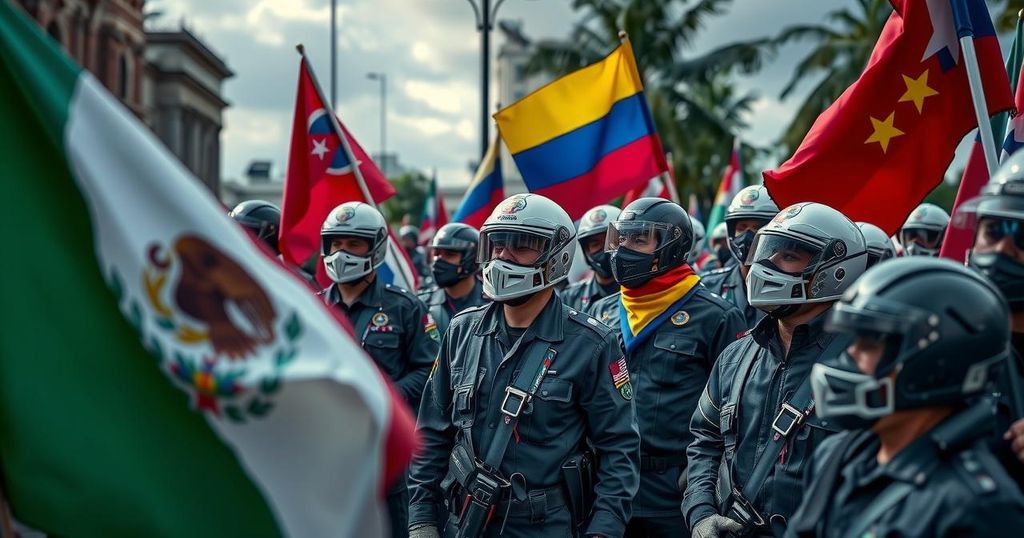Mexico’s Alarming Support for Cuban Dictatorship: A Shift Towards Authoritarianism

Mexico has increasingly supported Cuba’s dictatorship, sending substantial amounts of oil and food, thereby stepping into a role traditionally held by Venezuela and Russia. This alignment raises concerns regarding Mexico’s domestic challenges and commitment to democratic values, particularly as it prioritizes aid to a repressive regime amidst its own crisis. Critics urge that Mexico should condition its support on human rights improvements in Cuba.
In a disconcerting shift in diplomatic relations, Mexico has aligned itself with nations like Russia and Venezuela in providing support to Cuba’s longstanding communist regime. Historically, this support traces back to the Cold War when the Soviet Union extensively aided Cuba, contributing over $29 billion. Following the Soviet Union’s dissolution, Venezuela stepped in to prop up the island nation, investing $35 billion in oil during the leadership of Hugo Chavez. As Venezuela faces its own economic struggles, Mexico has emerged as Cuba’s latest benefactor, facilitating the transfer of essential goods such as food and oil to sustain an economy in turmoil due to decades of failed communist policies. Notably, the current Mexican administration has taken controversial stances, such as leveraging its influence concerning migration to negotiate better relations with Cuba. This was epitomized in 2022 when Mexico withdrew from the Summit of the Americas in protest of the exclusion of Cuba, Nicaragua, and Venezuela. Simultaneously, Mexico finds itself grappling with an alarming surge in internal violence, which has included high-profile incidents such as bombings and political murders. In this precarious environment, Mexican President Claudia Sheinbaum has prioritized support for the Cuban government, personally committing to supply 5.4 million barrels of oil, valued at $391 million, as a testament to solidarity with a dictatorship notorious for human rights abuses and the existence of 1,100 political prisoners. As Mexico’s aid to Cuba increases, reaching approximately 13,000 barrels of oil per day, it raises concerns about the implications for Mexico’s own citizens, who are already reeling from systemic issues such as widespread blackouts and mismanagement of resources. Critics argue that this favoritism towards the Cuban regime under Sheinbaum’s leadership stands in stark contrast to the democratic values that Mexico professes to uphold. If genuine support for the Cuban people were to be the primary focus of Mexico’s foreign policy, conditions for aid would surely include prerequisites for democratic reforms in Cuba, including the release of political prisoners and the establishment of free elections. Thus, the support extended by Mexico to Cuba exacerbates both humanitarian crises and undermines Mexico’s democratic foundations, effectively aligning it with a cadre of authoritarian states that thrive on oppression. A reevaluation of such diplomatic ties is imperative to safeguard the values of democracy and human rights.
The article discusses the evolving relationship between Mexico and Cuba, particularly emphasizing Mexico’s recent increase in support for the Cuban government under President Claudia Sheinbaum. It provides historical context regarding Cuba’s reliance on foreign assistance, first from the Soviet Union and later from Venezuela, and now highlights Mexico’s pivotal role amid Venezuela’s challenges. The narrative contrasts the backdrop of Mexico’s own issues with violence and democratic integrity, suggesting that the support for Cuba mirrors a disillusionment with democratic principles.
In conclusion, Mexico’s burgeoning support for Cuba marks a troubling departure from established democratic values. As it chooses to back a regime characterized by repression and the absence of basic human rights, the potential ramifications for both nations’ political landscapes warrant critical examination. The prioritization of foreign aid to an authoritarian regime amidst domestic challenges raises ethical questions about the authenticity of Mexico’s commitment to democratic ideals. Without conditionality on aid tied to democratic reforms in Cuba, Mexico risks compromising its own democratic foundation while perpetuating the status quo in Cuba.
Original Source: thehill.com








